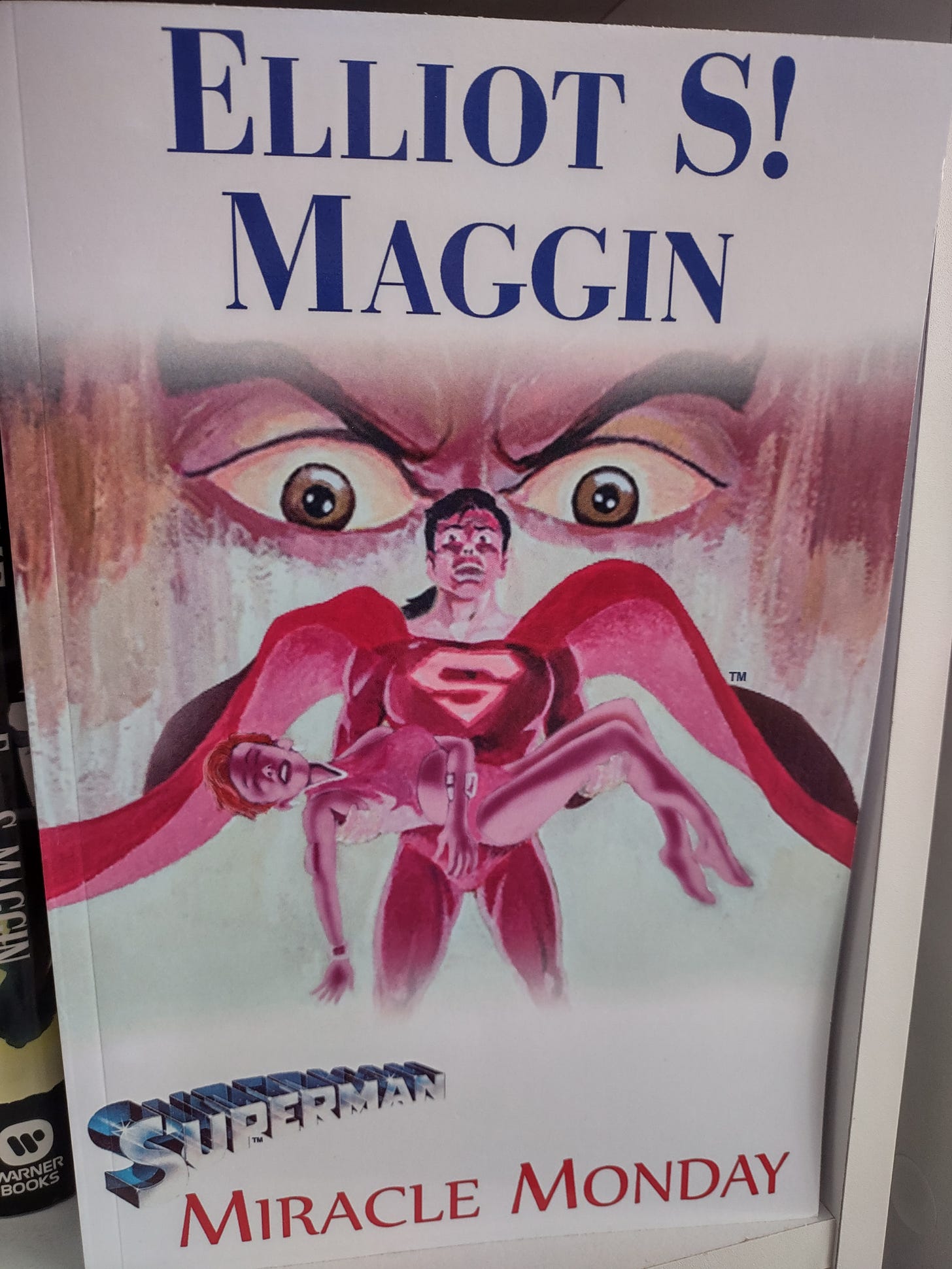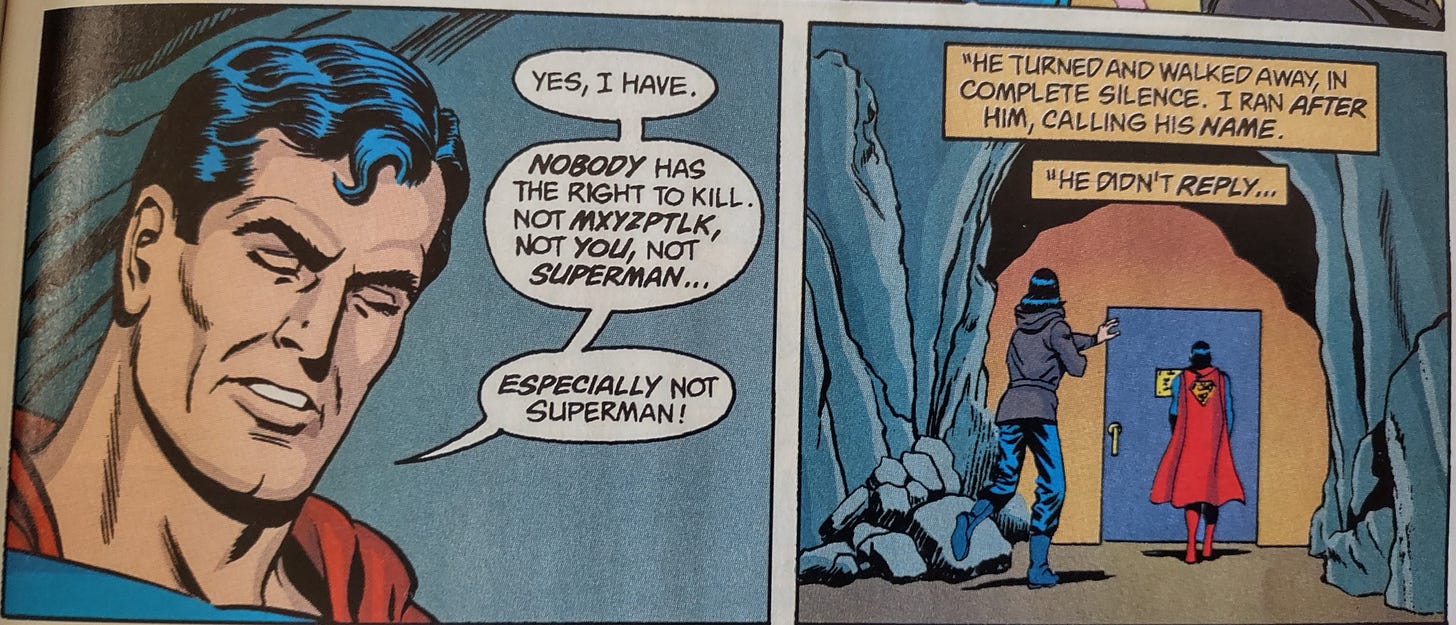Superman in Prose, Part 2
In which I finally read 'Miracle Monday'
I recently revisited a couple of Superman novels, which reminded me: Elliot S. Maggin had written two Superman novels, and I was long overdue for reading the second.
The first, Last Son of Krypton, came out around the time of Superman: The Movie. The second novel, Miracle Monday, coincided with the release of Superman II. But neither book focuses on the movie versions of the characters. The Superman depicted here comes straight from the comics of the late ’70s and early ’80s, when Clark Kent was a TV news anchor and merely served as an elaborate disguise for Superman.
As I noted in the previous post, two distinct categories of Superman stories have evolved since the mid-’80s comics reboot: stories where he’s Superman first while Clark Kent is an act that allows him to walk among people unnoticed, and stories where he’s Clark Kent first while Superman is simply how he chooses to use his tremendous gifts. I prefer the latter approach, but that Superman didn’t yet exist when Maggin wrote Miracle Monday, which makes a solid case for another way the Silver Age Superman could have been modernized.
In the novel, Lex Luthor escapes prison by passing through another dimension, and in doing so, he inadvertently grants a demon entry to Earth. This demon, known as C.W. Saturn, represents pure evil and has been responsible for many atrocities throughout history. Saturn’s aim now is to push Superman beyond his limits and destroy him—not physically but morally. Saturn wants to tempt Superman into breaking his most important rule; he wants Superman to feel that in order to save the world, he has no choice but to take a life. Of course, if Superman were ever to kill, he would cease to be Superman.
While this almost certainly wasn’t planned, the idea foreshadows the 1986 story Whatever Happened to the Man of Tomorrow?, the comics’ official farewell to the Silver Age Superman.
[SPOILERS follow, albeit decades-old spoilers.]
In that story, written by Alan Moore, Superman ends up killing an immensely powerful villain. Rather than attempting to rationalize the act as serving the greater good, Superman convicts himself on the spot. He knew that by killing that villain, he was killing Superman as well, so he exposes himself to gold kryptonite, which permanently removes his powers, and he starts a new, human life with Lois Lane.
The novel isn’t a farewell to Superman, though. It’s an exploration of who he is and why he’s such a great superhero, and it uses the novel medium to drill deeper into his head than comics or movies can.
The beginning of the novel focuses on his Smallville days. In this incarnation, his powers manifested as soon as he crashed to Earth (unlike later stories, where Clark was mostly normal until puberty). We see Jonathan Kent’s fears about what might happen if he and Martha fail to raise Clark right—that weight of responsibility that we later see in Superman.
In one particularly great sequence, the school bus young Clark is riding hits a dog, accidentally killing it. The other kids feel bad but soon move on with their day. But Clark can’t let it go, and the super-powered boy who had never been sick a day in his life becomes so ill that he leaves school early.
Clark later tells his parents, “It’s not all right! It’s really not. How could it be all right? None of the other kids could’ve helped it, the driver couldn’t’ve helped it, even the dog couldn’t. Only I could’ve helped it. And I could’ve, too!”
At his father’s suggestion, Clark puts on his Superboy costume for the first time.
The narrator says, “On that hill, silently and solemnly, Superboy promised himself and who or whatever else might hear his thoughts that his life would be devoted to the preservation of life; that he would use his powers whenever possible to save and improve the conditions of life and of living things everywhere; that under no circumstances would he ever be responsible for the loss of a single conscious life; that failing in any of these affirmations he would renounce his powers forever. There could be no nobler mission for a superman.”
Compare this to the end of the movie Man of Steel, in which Superman snaps Zod’s neck to prevent further killing. I wasn’t a fan of that movie, and I hated that scene. Part of the justification was that “him killing Zod would be the origin of the ‘no kill’ rule that would endure in films to come,” Collider writes.
But Superman doesn’t need to take a life to learn how horrible taking a life is. Maggin shows us how even the random, senseless death of someone else’s pet affects him deeply.
In another passage in this scene, Maggin describes how Clark perceives a special glow around all living things, “like a halo.” This glow takes on a different color depending on qualities such as emotional state and intelligence, and these colors are unique, defying all existing naming conventions.
“The boy did not feel he had to make up names for [the colors]; he had no one with whom to talk about them except himself. … But dead things, especially dead things that have lately been alive, look awful. They’re all gray and empty,” the narrator tells us.
What remains is “Just nothing, where there had been something that once glowed.”
Much later in the book, Superman turns his super-hearing up to full power for the first time and hears the full symphony of the Earth all at once—and understands that he’s a part of that symphony, not apart from it.
Along the way, we also see precisely how Superman feels about his Clark Kent act and how lonely he’d be without it, why Superman is the only man for Lois Lane and she’s the only woman for him, and even how much Superman misses his childhood friendship with Lex Luthor and still holds out hope that Lex might reform someday.
In Superman: Miracle Monday, Maggin expertly balances grandeur and humanity and shows us the inherent goodness of the Man of Steel, and how such goodness is anything but boring or outmoded. As much as I prefer the Clark Kent–first approach, this late–Silver Age version also represents everything Superman should be about.



